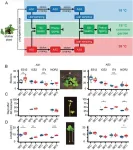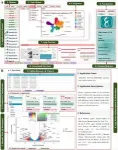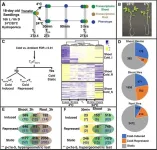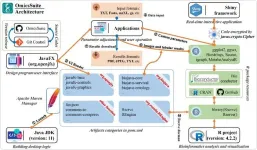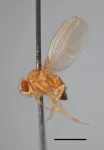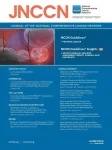(Press-News.org)
As global warming continues to redefine ecosystems, plants are increasingly tasked with swift adaptation to ensure their survival. One primary mechanism facilitating such rapid adaptation is epigenetic memory, specifically DNA methylation. DNA methylation, a form of epigenetic modification, involves the addition of a methyl group to the cytosine bases of the DNA, altering its accessibility in chromatin and modulating gene expression. In the context of a warming climate, changes in DNA methylation can be triggered by environmental factors like increased temperature. Such epigenetic adaptations play an instrumental role in allowing plants to synchronize their growth with evolving environmental cues. However, a comprehensive understanding of how these DNA methylation changes affect plant phenotypes, especially in response to warmer temperatures, remains unclear.
In July 2023, Horticulture Research published a research paper entitled by “Warmer temperature during asexual reproduction induce methylome, transcriptomic, and lasting phenotypic changes in Fragaria vesca ecotypes”.
To examine the influence of temperature on phenotypic and epigenetic variations, an experiment was conducted across three asexual generations on four European F. vesca ecotypes (ES12, ICE2, NOR2, IT4), exposing them to 18℃ and 28℃. At the phenotypic level, the ES12 ecotype had an increased stolon production at 28℃ during the first asexual generation (AS1) but not by the third (AS3). Conversely, the IT4 ecotype displayed decreased stolon production at 28℃ in both AS1 and AS3. The ICE2 and NOR2 ecotypes showed significant delays in flowering time at 28℃ by AS3, with statistical significance at 0.05 > p > 0.001. For petiole length, plants from the ES12, ICE2, and NOR2 ecotypes had longer lengths when grown at 28℃ during AS1. By AS3, the increased petiole length remained only for the NOR2 ecotype. The results showed a statistically significant difference between the all phenotypic traits investigated and growth temperature in the experiment, which can be preserved during asexual reproduction. Further in-depth studies at the molecular level, bisulfite-sequencing of the genomic DNA samples from the ecotypes revealed discernible differences in DNA methylation patterns between the two temperature conditions, especially in the CHG and CHH contexts. NOR2 exhibited the most pronounced difference in methylation levels between the temperature conditions. Principal Component Analysis (PCA) of methylation profiles showed clear differences between ecotypes grown at 18℃ and 28℃. Significant changes in both hypo- and hypermethylation occurred across all ecotypes with the largest temperature-specific methylation increases observed for the CHH context. Notably, methylation changes were identified to be correlated with genomic features such as transcription start sites (TSS) and transcription termination sites (TTS). Regions with differential CHG and CHH methylation typically exhibited hypermethylation. At the same time, transcriptome changes related to temperature increase were observed in approximately 3,500 to 5,000 differentially expressed genes (DEGs) in different ecotypes. In addition, this study also explored the ecotype specific methylation and expression patterns of genes related to gibberellin metabolism, flowering time, and epigenetic mechanisms. It was found that among three or fewer ecotypes, the absolute multiple change of 1,318 related differentially expressed and differentially methylated genes (DEDMGs) was>1.5.
In summary, the research indicates that temperature variations during asexual propagation induce considerable hereditary epigenetic and phenotypic modifications, underscoring the existence of a temperature-related epigenetic memory effect in F. vesca ecotypes. This groundbreaking study not only deepens our understanding of plant adaptation but also opens the door for leveraging epigenetic memory to develop crops better suited to the warming world.
###
References
Authors
YuPeng Zhang(张宇鹏)1,2, Guangxun Fan3, Tuomas Toivainen3, Torstein Tengs2, Igor Yakovlev2, Paal Krokene2, Timo Hytönen3, Carl Gunnar Fossdal2,*, Paul E. Grini1,*
Affiliations
1. EVOGENE, Department of Biosciences, University of Oslo, 0313 Oslo, Norway
2. Department of Molecular Plant Biology, Norwegian Institute of Bioeconomy Research, 1431 Ås, Norway
3. Department of Agricultural Sciences, Viikki Plant Science Centre, University of Helsinki, 00014 Helsinki, Finland
About Carl Gunnar Fossdal & Paul E. Grini
Carl Gunnar Fossdal: He is currently head of Department Dept. Forest Health, Division for Biotechnology and Plant Health, NIBIO, Norway. His research areas are epigenetics, genomics, plant-pathogen interactions, phytobiome, forest health, wood decay, and fungal enzymes.
Paul E. Grini: He is a professor at the Department of Biological Sciences, University of Oslo. His research focuses on the biology of plant reproductive development.
END
Cold sensitivity poses a significant challenge for certain essential crops. While there's an indication that these plants may possess cold acclimation capabilities, the molecular dynamics, particularly involving the CRT binding factor (CBF) family, are not fully explored. One primary concern has been the disparity in cold tolerance between temperate plants and tropical species such as the tomato. Additionally, the accumulation of small metabolites, termed cryoprotectants, plays a crucial role in enabling plants to resist damage from low temperatures. Adding ...
Abstract:
With the advancements in high-throughput sequencing technologies such as Illumina, PacBio, and 10X Genomics platforms, and gas/liquid chromatography-mass spectrometry, large volumes of biological data in multiple formats can now be obtained through multi-omics analysis. Bioinformatics is constantly evolving and seeking breakthroughs to solve multi-omics problems, however it is challenging for most experimental biologists to analyze data using command-line interfaces, coding, and scripting. Based on experience with multi-omics, we have developed OmicsSuite, a desktop suite that comprehensively integrates statistics and multi-omics analysis and visualization. The suite ...
Even on a good day the environment can be wildly unpredictable, from unexpected gusts of wind to food scarcity, and as humans continue to edge out the natural world, the stress on wild populations is increasing. ‘Bats are critical for the maintenance and stability of many terrestrial ecosystems’, say Mattina Alonge [University of California, Berkeley (UCB), USA] and Lucas Greville (McMaster University, Canada) and the animals are known to be particularly sensitive when under strain. But little was known about the impact that stress might have on their ability to reproduce. Concerned about the effect of stress on already vulnerable bat populations, Alonge and her colleagues ...
(Friday, 13 October 2023, Berlin, Germany) Almost half (42%) of patients with skin disease experience sleep disturbances, a major study presented today at the European Academy of Dermatology and Venereology (EADV) Congress 2023 has revealed.1
The ALL PROJECT, a comprehensive international research initiative, analysed over 50,000 adults across 20 countries to assess the impact of skin diseases.2
Notably, these sleep disturbances were found to have broader implications on patients' quality of life. Nearly half (49%) of patients with skin disease reported reduced productivity at work, in contrast with just one in five (19%) participants without a skin disease.1
The ...
Boston – The Kraft Family Blood Donor Center, which provides lifesaving blood products to patients at Dana-Farber Cancer Institute and Brigham and Women’s Hospital, announced today that it has finished implementing a more inclusive blood donation process, in alignment with updated guidelines issued by the U.S. Food and Drug Administration (FDA) that will allow many gay and bisexual men to donate blood and platelets.
On May 11, 2023, the FDA changed its policy to reflect that deferring prospective blood donors based on sexual orientation is no longer supported by data. ...
Back when the biggest fly enthusiasts of 19th century Sweden — Carl Fredrik Fallén, for one, and later Johan Wilhelm Zetterstedt — were collecting insects for what would become Lund University’s entomological collections, they wondered exactly what was that buzzing coming from their can of raisins.
Skip forward 200 years, and the humble fruit fly, known better to geneticists as Drosophila melanogaster, is one of the most thoroughly studied animals on the planet. And DNA from Fallén and Zetterstedt’s centuries-old curiosities are still revealing new insights into the fly’s evolution as it spread alongside ...
PHILADELPHIA (October 11, 2023) – Police officers often respond to incidents that do not involve crime or immediate threats to public safety but instead deal with community members facing unmet mental health needs. In response to this, many cities are experimenting with co-deploying police officers alongside health professionals or deploying teams entirely composed of civilian health professionals.
Recently, researchers from the University of Pennsylvania School of Nursing (Penn Nursing) explored the perspectives and preferences about these programs among residents in structurally disadvantaged areas where mental health distress is ...
PLYMOUTH MEETING, PA [October 12, 2023] — New research in the October 2023 issue of JNCCN—Journal of the National Comprehensive Cancer Network finds that intensive local-regional treatment to remove as much tumor as possible (known as “debulking”), in addition to standard systemic therapy, does not impact overall quality of life significantly for people with metastatic colorectal cancer.
The researchers examined the ongoing ORCHESTRA trial (NCT01792934) to compare patients treated with standard palliative chemotherapy alone to those who received palliative chemotherapy plus either surgery, ablative therapy, and/or radiotherapy ...
UNIVERSITY PARK, Pa. — True altruism is rare behavior in animals, but a new study by Penn State researchers has found that honey bees display this trait. Additionally, they found that an evolutionary battle of genetics may determine the parent they inherit it from.
For the study, published in the journal Molecular Ecology, the researchers examined the genetics behind “retinue” behavior in worker honey bees, who are always female. After the worker bees are exposed to the queen bee’s pheromone, they deactivate their own ovaries, help spread the pheromone to the other worker bees, and tend to the queen ...
BOSTON – The brain is made up of numerous types of cells that are organized into different structures and regions.
Although several important steps have been made towards building models of the human brain, the advances have not produced undistorted 3D images of cellular architecture that are needed to build accurate and detailed models.
In new research published in Science Advances, a team led by investigators at Massachusetts General Hospital (MGH), a founding member of Mass General Brigham (MGB), has overcome this challenge to offer scientists and clinicians a comprehensive cellular atlas of a part of the human brain known as Broca’s area, with ...
